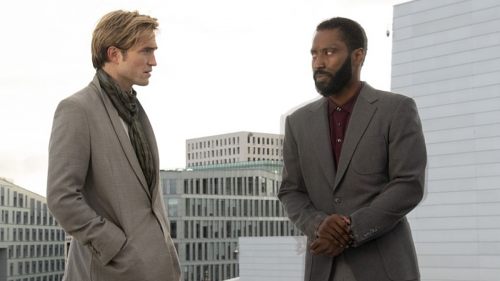On the Aggressively Masculine Perspective Of INTERSTELLAR
Interstellar is an aggressively male film, a timeless narrative about the arrogance of man in the face of futility. Perhaps Nolan himself doesn’t comprehend the metatextual undertaking of the project -- his own arrogance and forceful hand, and the excessive tendencies that echo the fictive human race, who unknowingly depend on Matthew McConaughey’s loose cannon space cowboy to save them all. He’s the only man for the job. His father-in-law says he was born too early or born too late. He’s an action hero whose brain was transplanted from VHS tapes recovered from the late ‘80s and early ‘90s.
McConaughey is the embodiment of what we currently envision as blue collar manliness; he is the Hollywood version of masculinity on two legs. He’s southern but not moronically hillbilly; lean but not scrawny; sensitive but no wussy; athletic but not threatening to your own manhood. One looks upon him and their sense memory takes a cross-country tour of the great outdoors. He probably smells like the forest and the sea and the beach and the mountain air. “I’ve been everywhere, man.” And so he is an everyman’s man.
On board the goodship Interstellar, Nolan has seemingly met his quota: Astronaut Anne Hathaway (female), Astronaut David Gyasi (black), Astronaut Wes Bentley (we are still finding his place in this universe) and Matthew McConaughey, who represents the American status quo. He is the best man for the job because he literally selected himself for the position. Surrounded by a starving and dying human race, McConaughey’s Cooper is a man who always dreamed of leaving the planet behind and chasing the stars. Even when we’ve consumed everything and we’re collectively gasping for Earth’s final breath, there are still men like Cooper who will ask for more.
Nolan’s film asserts its masculinity from top to bottom, from the layers of dust and dirt that encumber the earth to the men who take up the farming to protect what’s left after the blight has ravaged most of the world’s crops. There’s Michael Caine’s Professor Brand, who has shouldered himself with solving an impossible equation that could save humanity, and has sent Cooper’s crew into a wormhole to follow a previous mission to another galaxy for possibly habitable planets. Jessica Chastain plays the boyishly-named Murphy, daughter of Cooper, who spends most of the film waiting for her father to return and working to help Brand solve his equation, forever stuck in her father’s orbit and in the service of man.
Interstellar honors a long tradition of psychosexual metaphors in science-fiction cinema, repeatedly using the docking of a spaceship as an integral narrative device. The spaceship itself is not just an extension of Cooper’s masculinity -- his own long-gestating ambitions and dreams on the precipice of realization -- but an enduring patriotic symbol of our exploration of the universe, and the pursuit of so many conquerors to plant their flags on uncharted lands, in the rush to claim it as their own. It is a man’s quest to stake his claim and populate that delicate virgin territory, just as many men undertake the banal practice of deflowering virgin flesh. To these male conquerors who came first it is a victory to brag about, but to so many women it’s just remembered as that one thing that happened 10 or 20 years ago with some dude they barely remember. If these planets could talk.
The spaceship itself is also a phallic symbol, an extension of the penis itself, and Cooper must guide it into position at the docking station and lock it into place. Nolan’s cinematography is anything but subtle, the docking scenes choreographed with all the tension-mounting sensuousness of a love scene. This isn’t space ballet; it’s space Zalman King. As Cooper successfully docks the ship in the station, the scene is punctuated by an ejaculatory sigh of relief. We’re treated to another one of Cooper’s penetration metaphors again, when he pulls one of those loose cannon moves, proving why he was the only man for the job, docking the ranger in the station. “It’s not possible,” he’s told. “It’s necessary,” he replies, delivering a one-liner as smoothly as any of his action hero predecessors. Later, Matt Damon’s Dr. Mann will struggle to dock the ship, fumbling like a hasty lover, overeager and salivating at the prospect of his own villainy, invisible mustache casting a shadow over his shoulder. If he sees it we’ll have six more weeks of Interstellar runtime. He can’t properly dock the ship because it’s not his phallic symbol to wield, and he doesn’t have permission to penetrate. Even in space, man cannot keep from solving every problem by trying to fuck it, and in Dr. Mann’s case, by force, if necessary. Dr. Mann represents humanity’s worst tendencies, and perhaps Nolan’s own: he means well, but he’s too forceful, too arrogant and too selfish. “Dr. Mann, tell us about your world,” Amelia asks. You don’t exactly have to reach for the stars for that “It’s a Mann’s world” punchline.
It is man’s arrogance and selfish, rational thought and destructive survival instincts that drive Interstellar’s basic narrative, while characters like Hathaway’s Amelia and Chastain’s Murphy introduce variables like intuition, instinct and the values of nurturing and irrational love. The women are the most interesting part of the film, which is unfortunate as the script is so hasty to dismiss them as viable. Instead, they are merely an afterthought, casualties of Nolan’s limited perspective, trapped in an inelegant thesis statement on masculinity and hubris.



